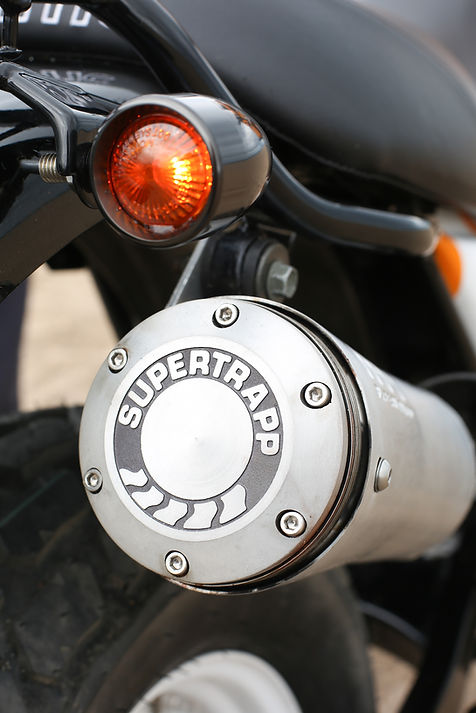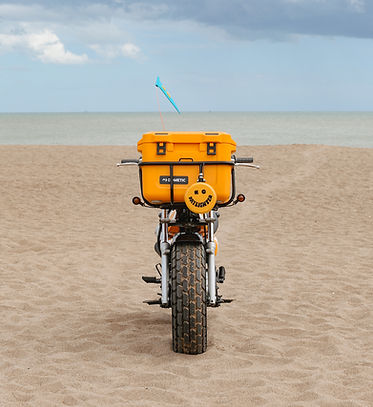SAND FLEA
Words: Gary Inman
Photos: Charlie Davidson
Growing up in the 1970s, my Fab Four were never John, Paul, George and Ringo, it was Snorky, Fleegle, Droopy and Bingo – The Banana Splits. Conceived by Hanna-Barbera, the show featured the four creatures, who, like prototype sports team mascots, were blokes dressed in furry outfits and firefighter helmets. They were a pop band, lived in a shared psychedelic house and got into Three Stooges-style slapstick scrapes. Hey, it was conceived in California in 1968, what do you expect? It was still being shown on UK TV years later, when it served as a sun-drenched 30 minutes of primary-coloured eye candy, especially for a kid in a home-knit jumper, growing up in the washed-out, drizzle grey of northern England at the time. But what stuck in my mind most is the six-wheel Amphicat all-terrain buggies the stars tore around in during the title sequences of the show.
It was The Banana Splits and their buggies that inspired this 2003 Suzuki VanVan 125. At least in part. The other part being Sideburn, the magazine I edit. Sideburn is heavily weighted towards dirt track, but has always found room for street trackers, art, photography, movies, road trips and adventure riding, since launching in 2008. Still, since becoming the official magazine of the American Flat Track professional race series in 2020, I had been thinking more about the pro sport and how the mag looked to new readers, who were picking it up at races in Texas or Ohio. This Suzuki was a reminder to myself, and potential readers, that Sideburn is about more than just racing.
The basis for the build must be one of the earliest VanVan’s in the UK, being a 2003 model. These 125s are popular with learners because the seat is so low and they’re supremely reliable. I’ve always loved the looks. They’re comical, loveable, instantly recognisable and as threatening as a gummy bear. This one had less that 10,000 miles on it, but 20 owners on the logbook. The last owner, an older guy, bought it in lockdown and never rode it.
With the look of Fleegle’s Amphicat tattooed onto my memory for over forty years, the first thing was to find another VanVan rear wheel, so I could have my own two-wheeled beach buggy with chubby rims front and rear. It soon occurred that Suzuki were almost certainly going to spec the VanVan this way, but backed out late in the development process. The distance between the front forks, the width and shape of the front fender and its mounting all allow the same 180/80-14 balloon rear tyre and rim to fit straight in and more naturally than the stock, more conservatively-sized 130/80-18 the bike was delivered with.
It wasn’t enough that both wheels were chunky, they were sent to CJ Powder Coatings, Grimsby, to be turned two-tone. It was difficult to get the clean line where the two colours met, but CJ persevered. Then the famous old British company, Hagon, laced the existing front disc hub to the new rim with stainless spokes. I managed to snag one of the last brand new Dunlop 14in K180 tyres in the country.
You might have noticed the defining element of the Sand Flea, the front basket that holds a Dometic Patrol 20 cooler than coolbox, a last-a-lifetime piece of kit I’d been lusting after for a while. JB Fabrication, of Lincolnshire, fabricated a steel tube basket around it. JB also welded on brackets for the 6in projector headlight and a pair of Motone Billet turn signals. The basket hangs off the triple clamps. How does that affect the handling? Well, it’s not going to win any trials competitions, especially when the coolbox is full of a few beverages, a bag of ice and my sandwiches, but I can live with it.
The deck chair stripe paintjob in summer sorbet colours was completed by Paint By Matt, in Leeds, Yorkshire, while the seat was embroidered and recovered by Holy Goat Motorcycle Seats, Devon. The newly powder-coated chassis was bolted back together with a Hagon adjustable monoshock replacing the corroded original RSU.
The route of the stock exhaust suited the all-terrain feel of the bike, and I liked the oversized stock silencer, but this is a custom bike, so it was chopped to make room for a classic Supertrapp, one of the neatest end cans you can get to fit small diameter exhausts.
Biltwell Mushman pegs, leftover from my Harley Sportster hooligan racer, were made to fit; a Motone Cuda taillight and licence plate bracket bolted to the rear fender; a KC headlight cover evoked the same 1970s good time spirit in me as memories of imported Saturday morning TV, and I finally found a home for the hand-tooled leather handlebar pad made for me by Busch & Busch, of Reno, Nevada. I’d had it stored for years ago, just waiting for the right project, and fit it to the Renthal bars.
There was just one last thing. A flag. Not every bike can carry off a flag, but the Sand Flea could, and one was made by my friend, Fionnadh Lyle, with yet more 1970s inspiration, this time in the shape of the SB, for Sideburn, in Cooper Bold font. It’s hoisted on a whippy CB aerial.
With a carrying capacity of 20 litres out the front, a rear rack for a beach towel, and flying its own freak flag, the Sand Flea is a whole 12 horsepower of good times, and a reminder that life isn’t always about chequered flags, winners and losers.
Thanks to George & Amy for modelling














